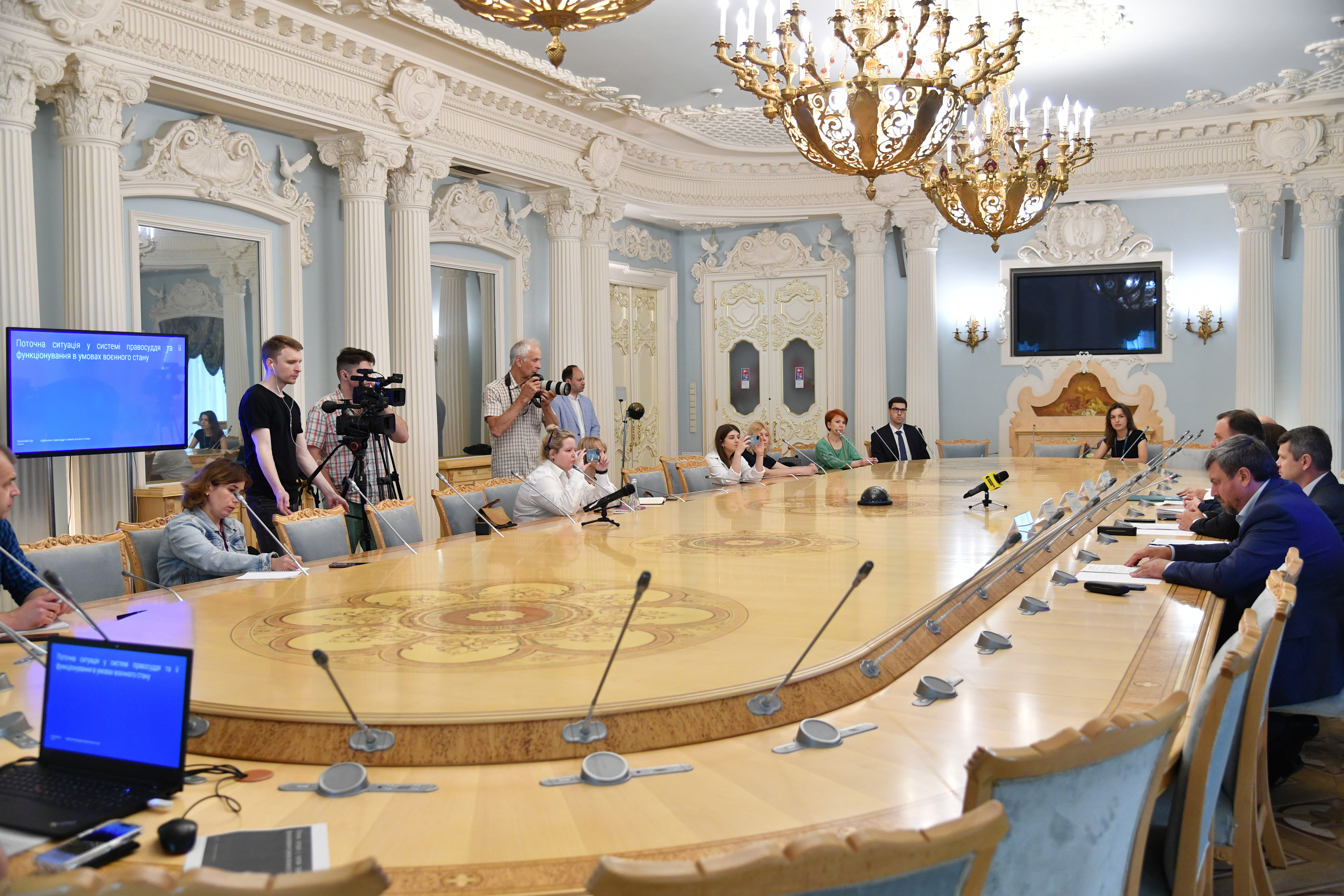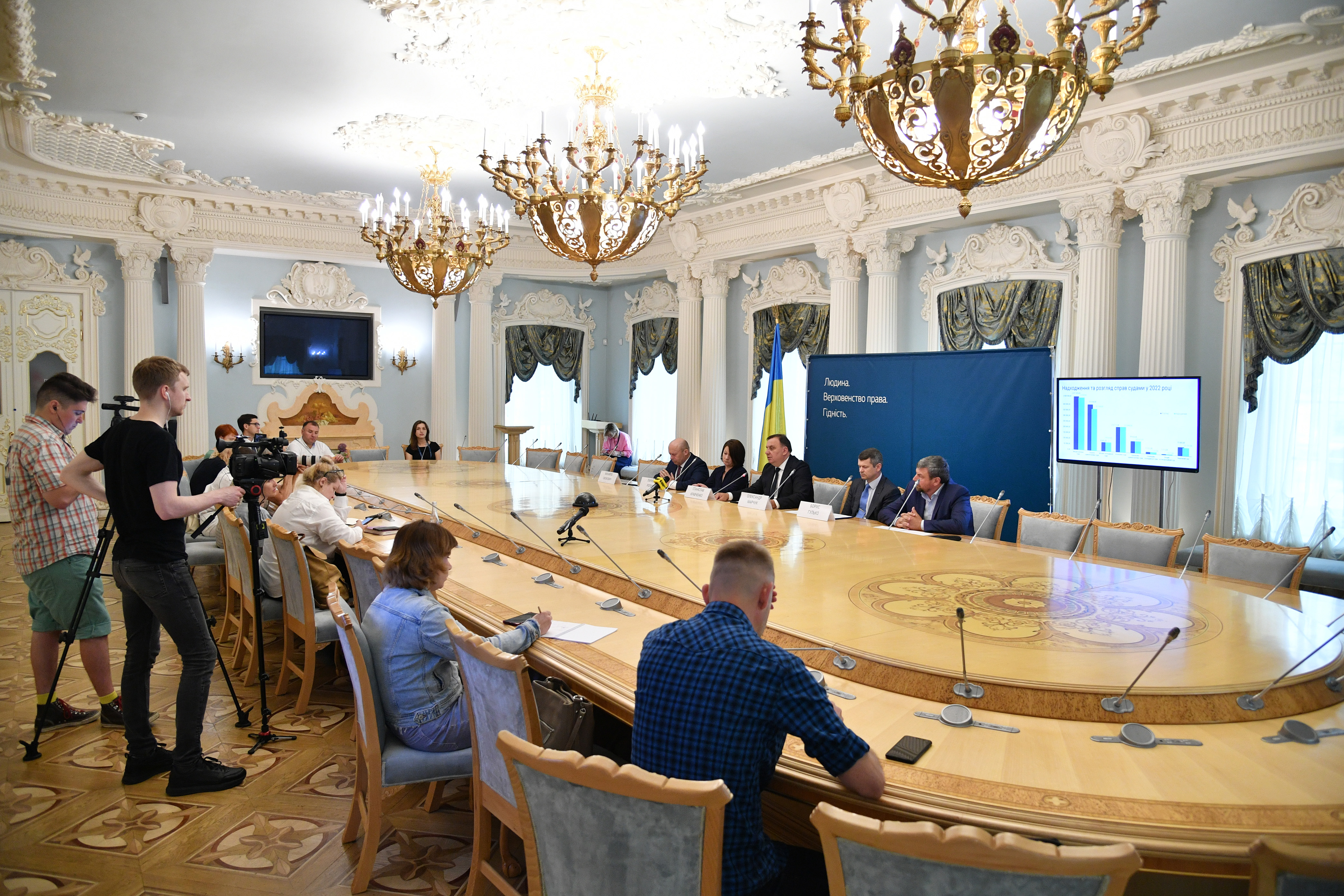Contact center of the Ukrainian Judiciary 044 207-35-46

"Despite all the challenges, the judiciary, like the state in general, continues to carry out its functions properly. We are desperately fighting the external enemy, but we are not forgetting the internal one. Certain shameful acts committed by representatives of various branches of state power should be subject to appropriate legal assessment. I believe that we will be able to overcome these two enemies and restore confidence in the judiciary and other state institutions, which in turn will help accelerate Ukraine's European and Euro-Atlantic integration, to which the Ukrainian people aspire," said the President of the Supreme Court, Stanislav Kravchenko, at the briefing.
According to the SC President, in 2022, Ukrainian courts handled more than 2 million cases, with almost 70,000 cases reviewed by the Supreme Court. In terms of their types, new categories of cases and proceedings certainly emerge during the war. At the same time, the courts are receiving a large number of cases from the relevant jurisdictions, of which there were very few before the war.
The criminal justice system is characterised by an increase in proceedings for crimes against national security, war crimes, and military crimes. In civil and commercial proceedings, disputes arise concerning compensation for damage caused by aggression, as well as disputes relating to the non-performance or improper performance of obligations as a result of the war. Administrative proceedings include disputes relating to the status of internally displaced persons and the proper implementation of the guarantees assumed by the state as a result of this status.

The President of the Administrative Cassation Court within the Supreme Court, Mykhailo Smokovych, noted that the Supreme Court had developed case law in resolving certain types of disputes in administrative cases. In particular, legal conclusions were drawn on the conditions for an internally displaced person to acquire the right to a subsistence allowance; on the non-jurisdiction of administrative courts over disputes concerning the challenge of the issuance of a summons drawn up pursuant to the legislation on military service; on the non-relevance of a document confirming the removal of a person from the military register as a basis for crossing the border under martial law; on the peculiarities of the tax payer's exemption from the obligation to pay customs duties for the period of martial law, etc.
Larysa Rohach, President of the Commercial Cassation Court within the Supreme Court, said that local commercial courts were currently considering a large number of claims for damages caused by the military aggression of the Russian Federation. The growing number of cases in this category raises questions about evidence and remedies. In addition, she noted that since the beginning of Russia's full-scale invasion of Ukraine, the Supreme Court had been faced with new jurisdictional disputes over the following: whether the courts could resolve disputes where the Russian Federation is the defendant; whether commercial courts have jurisdiction to consider disputes challenging decisions of military commanders on the compulsory alienation or seizure of property under the legal regime of martial law. There are also new procedural issues: adjournment of the trial in connection with the announcement of an air raid alert; suspension of proceedings due to the fact that a party to the case is a member of the Armed Forces of Ukraine; the possibility of considering a cassation appeal in the absence of a party's representative - a lawyer who is outside Ukraine during martial law.
Oleksandr Marchuk, President of the Criminal Cassation Court within the Supreme Court, drew attention to the fact that, according to the Prosecutor General's Office, 97,000 crimes of aggression and war crimes and 17,000 crimes against the national security of Ukraine had been registered as of 7 July. According to him, during the full-scale invasion, the courts of first instance received 1,300 criminal proceedings on high treason (almost 500 have been considered), over 1,800 on collaboration (over 700 have been considered), 850 on justification, recognition of the legitimacy, denial of the armed aggression of the Russian Federation against Ukraine, glorification of its participants (over 650 have been considered). In addition, the courts received 130 criminal proceedings on violations of the rules of warfare (38 were considered), three on planning, preparation, unleashing and waging aggressive war, two on genocide and one on ecocide.
The Supreme Court has formulated a number of important legal positions in the resolution of civil disputes. Borys Hulko, President of the Civil Cassation Court within the Supreme Court, spoke about them. These positions relate to the issues of immunity of the Russian Federation and compensation for damage caused by the armed aggression of the Russian Federation; modification, termination of obligations in connection with the war; establishment of the facts of birth or death during martial law; taking into account the martial law conditions when resolving disputes regarding the rights and interests of a child located on the territory of another state; contractual legal relations during the martial law regime.
For more information on the situation of the judiciary and its functioning during the war, as well as important legal positions of the Supreme Court regarding the protection of citizens' rights during martial law, see the presentation: Supreme Court Briefing "The Administration of Justice Under Martial Law".
